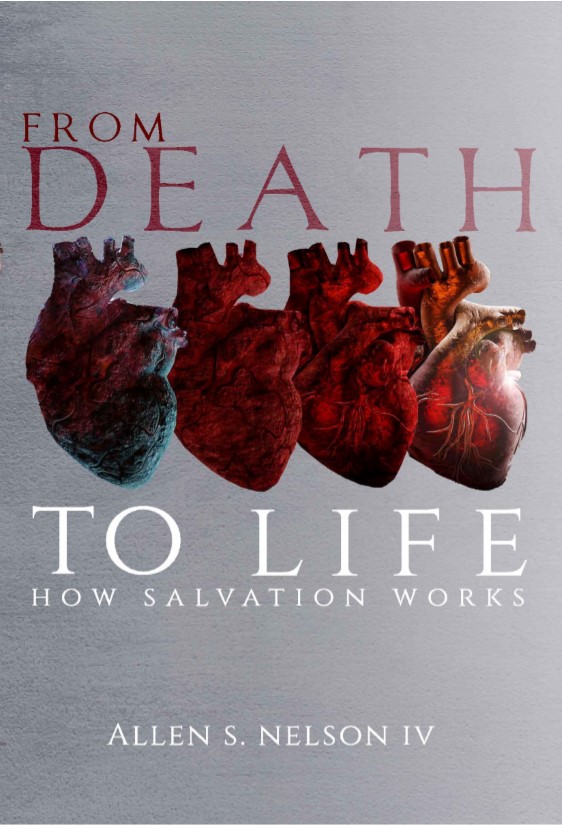
Free Grace Friday is a weekly post sharing updates and book excerpts from Free Grace Press. Each Friday we will be posting news about FGP books, featuring excerpts, and most exciting for you, telling you how you can get access to great sales on biblically solid, Christ-honoring resources from FGP.
How Salvation Works
Our featured book this week is From Death to Life: How Salvation Works by Allen S. Nelson IV. Any serious-minded reader of Scripture has observed that the current culture’s definition of what constitutes a Christian stands in stark contrast to the Bible’s description of true believers. There are several streams that feed into this river of confusion, but a key contributor is an inaccurate understanding of how a person actually becomes a Christian.
In From Death to Life: How Salvation Works, Pastor Allen Nelson puts forth a biblical case for how a person passes from the realm of being an unbeliever, into the Kingdom of light. This work shows that such an understanding has many practical ramifications for local churches as well as individual evangelistic endeavors. How salvation works is a subject important enough to spend some serious time considering and here is a gospel-focused, biblically oriented book that will lead readers to do just that. Pastors, laypersons, and even unbelievers will benefit from carefully thinking through these pages and examining its contents in light of Scripture.
For today’s Free Grace Friday enjoy an excerpt from chapter 4 of this book, A Change of Heart. Below, is a free download of the entirety of chapter 4 as well as a free .pdf teacher’s guide to accompany the book for Small Groups. Visit the Free Grace Press website to order your copy!
A Change of Heart
The second step in how a person becomes saved is that God initiates the proper response from the sinner. He brings about a change of heart.[1] While gospel proclamation is absolutely necessary for salvation, it is not all that must happen in order to see someone saved. Something more must transpire.
In fact, every single person who has ever lived and heard the gospel has responded to it. And all who ever will hear the gospel will respond to it—in one way or the other.
The problem is, because of sin, all mankind responds to it negatively unless God intervenes. Left to ourselves (remember Romans 3), our response is one of denial, refusal, and rejection. No one seeks after God. Instead of running to Jesus in faith we rail against Him, mock Him and get back to our rebellious lives as quickly as we can. Like The Matrix, we prefer to take the blue pill and suppress the truth so that we can continue living in our alternate reality.
If anyone is to be saved, something must happen to wake us up. Something must happen in a person’s heart to go from hating God[2] to loving Him. Something must happen to bring us from death to life. Everyone responds to the gospel, but the only way one will respond satisfactorily to the gospel is if God first brings about a change of heart.
Jesus said, “No one can come to me unless the Father who sent me draws him.”[3] This seems pretty straightforward, but early in the history of the church a popular teacher by the name of Pelagius (c. 360-418 AD) took offense at the thought that man needed God’s gracious act in order to come to Christ. When we look around the evangelical world today, we notice there are many who seem to be of the same mind as this false teacher.
Pelagius believed that man had everything he needed within himself to come to God on his own. Apparently, Jesus didn’t get that memo. Pelagius pretended to know what was in man, but Jesus actually knows what is in man.[4] Jesus is right. Though all men have permission, no man, because of our sin, has the ability to come to Him without something happening first. Let’s digest this a little further.
Though the gate of salvation stands wide open and all may come and freely drink of the fountain of life, the problem is, that left to ourselves we don’t want anything to do with God and we certainly do not desire to submit to His terms for salvation. We cannot come because we will not come. Our natural inclination is not to draw near to God but to hide from Him like our first parents.[5]
Most people won’t admit it, but if they do not belong to Christ, they actually hate God.[6] They want nothing to do with Him, with His word, or His church. They do not believe His commands are to be followed, and they believe His people are fanatics. Practically speaking, they live their lives as if there were no God at all. Although the light has come into the world, men would rather live in the darkness of sin.[7] They need a change of heart.
Daryl Wingerd writes:
“Simply put, sinners love their sin more than they want to be saved from it. They love wickedness more than the God who condemns them for it. They are enamored by this world, with its priorities and values, more than by the world to come “in which righteousness dwells” (2 Pet. 3:13). By nature, they are attracted to their guilty pleasures more strongly than they are drawn to Christ, who came to free men from slavery. Sin is what they crave. God, Christ, the gospel of grace, repentance, and righteousness, are what they are repulsed by. Unbelief is willful and worthy of condemnation, not pitiable, justifiable, or excusable.”[8]
Dark is the stain that we cannot hide, but praise God for His pursuit of us. Just like He pursued Adam and Eve in the Garden, just like He pursed Abram in Ur, David in Bethlehem, and Saul on the road to Damascus, so too is God still in the act of pursuing rebellious sinners to this day. Aslan is on the move. God is drawing sinners to Himself. Marvelous grace indeed.
Some people confuse this drawing of God by saying God is drawing every single sinner to Christ every single time the gospel is proclaimed. After all, Jesus says, “And I, if I be lifted up from the earth, will draw all men unto me.”[9] So how should we understand this?
This is where we must remember a passage of Scripture can’t mean whatever we want it to mean. It must mean what God intended it to mean in its context (and that’s what we should want it to mean).[10]
In John 12:20, we see that Greeks joined the scene to worship. Twelve verses later Jesus clarifies that His death on the cross was in fact a global endeavor. God is saving people all over the world. From Arkansas to Argentina. From Pittsburgh to Pudong. He was referring to effectually drawing Greeks and Jews alike, not every single person who has ever lived.
As D. A. Carson notes, “The context shows rather clearly…that [John] 12:32 refers to ‘all men without distinction’ (i.e. not just Jews) rather than to ‘all men without exception’.”[11] In other words, the blood of Christ “ransomed people for God from every tribe and language and people and nation.”[12] God calls people out of sin from all over the world through the heralding of the gospel.[13] Because of unbelief, many people who hear the gospel will not embrace it. But the good news of God’s work is that He’s doing something about that in the lives of many others.
The reason many are not saved is not the fault of God, nor is it because of some insufficiency in the death of Christ. Rather, it is because all men, women, boys, and girls are sinners. William Gurnall (1616 – 1679) rightly summarizes this reality: “If you enter eternity with a hard, impenitent heart, you have no one to blame but yourself.”[14]
Left to ourselves, we don’t want Christ, and God has justly given many over to exactly what they most want.[15] God is not obligated to draw lost persons to Himself. He has no obligation to show mercy and grace to sinners, for if He did, it would no longer be mercy or grace. Mercy and grace are, by definition, unearned and undeserved.[16] No one seeks after God and He is perfectly just in leaving people to their own choice of rejecting Him.
Yes, the door of salvation stands wide open, but many will never find it because of their own unwillingness and cold, resistant hearts. As John Calvin wrote “No man is excluded from calling upon God, the gate of salvation is set open unto all men: neither is there any other thing which keepeth us back from entering in, save only our own unbelief.”[17]
God could turn on the lights in their heart, but He has chosen to leave them to their own choice of sin and death. This penalty for rebellion is right and just. But because of God’s amazing grace, it is not that way for all.
We see this concept clearly taught in the Bible, but we also see it unfold during evangelistic encounters. When you share the gospel, have you noticed how many are completely unmoved and unresponsive to it? You may proclaim the glorious news of the death of Christ for sinners to a group of people you know are lost and some respond by saying, “Did you see that ballgame last night?” Or when you passionately pour out the gospel to your 7-year-old and she responds with, “Can we have pizza for supper?” The opposite example holds true too: I prayed for my dad, and shared the gospel with him, for about fifteen years before he became a Christian. What finally happened? God changed his heart.
The point here is, unless God brings about a change of heart in the sinner, no one responds positively to the gospel. Think through this for just a moment. Suppose someone says to you, “I’ve had a change of heart. I’m now a Christian.” How did this change of heart happen? Did this person finally get smart enough? Did they finally make up their mind that they didn’t like sin? Did they evaluate all the evidence in front of them and conclude that following Jesus was the wisest course of action? If the answer is “yes” to any of those questions, then they haven’t been saved by grace but by something they’ve done.[18] This would reduce evangelism merely to convincing people to activate their inner “faith muscle” and grab the rope as the life preserver is thrown to them.
Actually, some evangelistic tactics are geared toward just that, aren’t they? But the biblical reality is that by nature, we all reject the light of the gospel.[19] We are perfectly content following the imaginary god we’ve created in our own fallen minds—patterned after ourselves in most cases. The god we create is certainly not the God of the Bible. No way do we want to exchange our fantasy world for submission to the King of kings.
So this isn’t God keeping people from Him. This is God giving people over to choose what they really want: sin.[20] No one will truly call Jesus, “Lord,” (and live as though He really is) except by the Spirit of God.[21]
If we hope to truly comprehend how salvation works, we must understand the priority of God’s acting upon the sinner. He must draw them to Himself. Certainly, God’s drawing includes a conviction of sin and a pressing upon the heart and mind of the need for Christ. But it entails even more: this effectual drawing is the regenerating work of the Holy Spirit. It is a literal change of heart.
[1] Quite literally, He gives us a new heart! (Ezekiel 36:26)
[2] Romans 8:7
[3] John 6:44
[4] John 2:25
[5] Genesis 3:8
[6] Romans 1:30. They won’t use the word “hate,” but it’s the same as a man saying he doesn’t “hate” his wife all while trying to poison her coffee every morning and sleeping around on her with other women every night. One might say he doesn’t “hate” his wife, but if he lived that way everyone would know that in actuality, he does.
[7] John 3:19-20
[8] Daryl Wingerd, http://bulletininserts.org/you-cannot-because-you-will-not-but-if-you-will-you-can/?utm_source=Copy+of+November+2017+Inserts&utm_campaign=Dec+2017+BI&utm_medium=email
[9] John 12:32
[10] As R.C. Sproul said: “It is your duty to believe and to teach what the Bible teaches, not what you want it to teach.” https://twitter.com/ RCSproul/status/934600309883719680
[11] D.A. Carson, The Gospel According to John (Leicester, UK: Intervarsity Press, 1991), 293. Later, Carson notes: “Here, [John 12:32] ‘all men’ reminds the reader of what triggered these statements, viz. the arrival of the Greeks, and means ‘all people without distinction, Jews and Gentiles alike’, not all individuals without exception, since the surrounding context has just established judgment as a major theme (v. 31),” 444. (i.e., context matters)
[12] Revelation 5:9
[13] Acts 13:48
[14] William Gurnall, The Christian in Complete Armour, Vol. 1 (Carlisle, PA: Banner of Truth, 1986), 224.
[15] Psalm 81:12, Romans 1:24
[16] R.C. Sproul, The Holiness of God (Grand Rapids: Tyndale, 1998), 155.
[17] Calvin’s Commentaries, Vol. 36: Acts, Part I, tr. by John King, [1847-50], at sacred-texts.com (Acts 2:14-21).
[18] Romans 11:6
[19] John 3:19
[20] Romans 1:28
[21] 1 Corinthians 12:3
The corporation shall not discriminate against applicants, employees, students, volunteers, and others on the basis of race, color, nationality, or ethnic origin; however, as a religious institution, the corporation reserves the right to deny or terminate employment or to deny or terminate any other status of persons whose lifestyle, words, actions or otherwise do not align with the corporation’s Statement of Faith, standard of conduct, or other policies of this organization.

